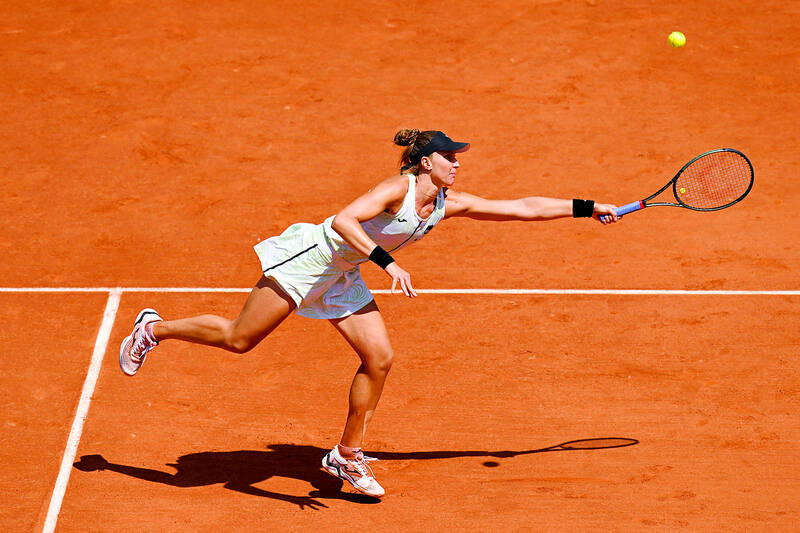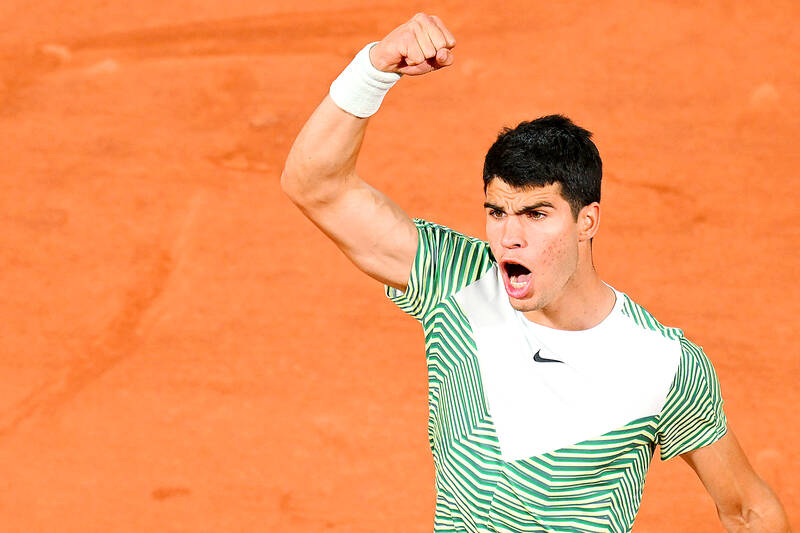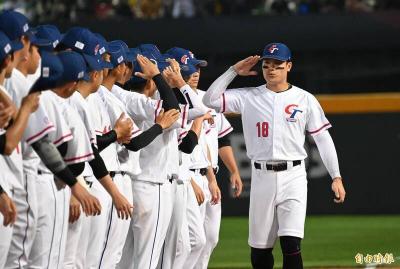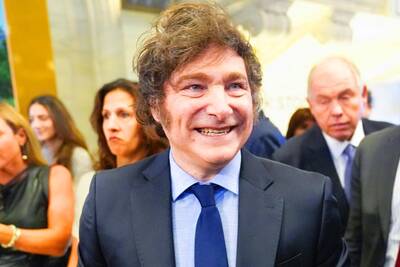Beatriz Haddad Maia yesterday became the first Brazilian woman to make a Grand Slam semi-final in 55 years after beating Tunisia’s Ons Jabeur at Roland Garros.
World No. 14 Haddad Maia came through against seventh-ranked Jabeur 3-6, 7-6 (7/5), 6-1.
The 27-year-old left-hander follows in the footsteps of seven-time major winner Maria Bueno who was the last Brazilian woman in the semi-finals of a major at the US Open 55 years ago.

Photo: AFP
Bueno, who passed away in 2018, made the last four in Paris in 1966 before the advent of the Open era.
“Ons is not easy to play against, you have to be patient, but I believed in my body and tried to keep my rhythm,” Haddad Maia said.
Jabeur, the runner-up at Wimbledon and the US Open last year, was playing in her first quarter-final at Roland Garros, while Haddad Maia had never got past the second round of a Grand Slam before.

Photo: AFP
Meanwhile, Novak Djokovic and Carlos Alcaraz are to square off in a blockbuster semi-final after winning their matches on Tuesday.
Djokovic, chasing a third crown at Roland Garros and a record 23rd men’s Grand Slam singles title, recovered from dropping his first set of the tournament to defeat 11th seed Karen Khachanov 4-6, 7-6 (7/0), 6-2, 6-4.
The 36-year-old Serb is in his 12th Roland Garros semi-final — his 45th at the majors — and faces Alcaraz for a place in the final after the world No. 1 thrashed 2021 runner-up Stefanos Tsitsipas in straight sets.
“That’s the match that a lot of people want to see. It’s definitely the biggest challenge for me so far in the tournament,” said Djokovic, who lost his only meeting with Alcaraz in Madrid last year. “If you want to be the best, you have to beat the best. He’s definitely a guy to beat here. I’m looking forward to that.”
Alcaraz once more showed why he is the favourite with a convincing 6-2, 6-1, 7-6 (7/5) victory over Greek fifth seed Tsitsipas in the night session, easily navigating his stiffest challenge to date.
The 20-year-old Spaniard has won all five meetings with Tsitsipas and becomes the youngest Roland Garros semi-finalist since Djokovic in 2007.
The war in Ukraine came into sharp focus again as Belarusian Aryna Sabalenka ended Elina Svitolina’s surprise run in the highest-profile match between two players whose countries are on opposing sides of the conflict.
Sabalenka won a politically charged encounter 6-4, 6-4 to extend her Grand Slam winning streak to 12 matches following her first major title at the Australian Open in January.
Svitolina was booed by the crowd on Court Philippe Chatrier after refusing to shake hands, a common practice now in the sport when a Ukrainian player meets a Russian or Belarusian opponent.
After boycotting her past two news conferences, Sabalenka insisted she is not a supporter of Belarusian President Alexander Lukashenko, a key military ally of Moscow.
“I’m not supporting the war, meaning I don’t support Lukashenko right now,” said the world No. 2, who has been urged by Ukrainian rivals to use her platform to individually stand up against the war.
“I don’t want my country to be involved in any conflict. I said it many times. You have my position. You have my answer,” she said. “I don’t want sport to be involved in politics, because I’m just a 25-year-old tennis player.”

The qualifying round of the World Baseball Classic (WBC) is to be held at the Taipei Dome between Feb. 21 and 25, Major League Baseball (MLB) announced today. Taiwan’s group also includes Spain, Nicaragua and South Africa, with two of the four teams advancing onto the 2026 WBC. Taiwan, currently ranked second in the world in the World Baseball Softball Confederation rankings, are favorites to come out of the group, the MLB said in an article announcing the matchups. Last year, Taiwan finished in a five-way tie in their group with two wins and two losses, but finished last on tiebreakers after giving

North Korea’s FIFA Under-17 Women’s World Cup-winning team on Saturday received a heroes’ welcome back in the capital, Pyongyang, with hundreds of people on the streets to celebrate their success. They had defeated Spain on penalties after a 1-1 draw in the U17 World Cup final in the Dominican Republic on Nov. 3. It was the second global title in two months for secretive North Korea — largely closed off to the outside world; they also lifted the FIFA U20 Women’s World Cup in September. Officials and players’ families gathered at Pyongyang International Airport to wave flowers and North Korea flags as the

For King Faisal, a 20-year-old winger from Ghana, the invitation to move to Brazil to play soccer “was a dream.” “I believed when I came here, it would help me change the life of my family and many other people,” he said in Sao Paulo. For the past year and a half, he has been playing on the under-20s squad for Sao Paulo FC, one of South America’s most prominent clubs. He and a small number of other Africans are tearing across pitches in a country known as the biggest producer and exporter of soccer stars in the world, from Pele to Neymar. For

A debate over the soul of soccer is raging in FIFA World Cup holders Argentina, pitting defenders of the social role of the beautiful game against the government of libertarian Argentine President Javier Milei, who wants to turn clubs into for-profit companies. Argentina, which gave the world Diego Maradona and Lionel Messi, is home to some of the world’s most devoted soccer fans — a fact attributed by supporters like Gabriel Nicosia to the clubs’ community outreach. Nicosia is a lifelong supporter of San Lorenzo, a more than 100-year-old first division club based in the working-class Buenos Aires neighborhood of Boedo where